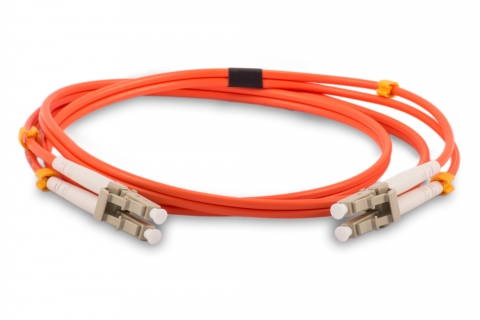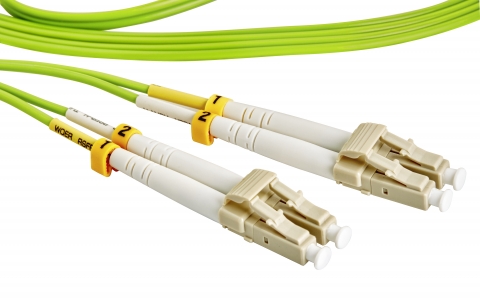Cables Blog
The Pros and Cons of Multi-Mode Fiber Optic Cable
Multi-mode Fiber Optic Cables at Cables.com
Why should you consider buying multi-mode fiber optic cables?
by Vikas Dayal • November 19, 2024
Custom Fiber Optic Cables, Fiber Optic Cables, Network Patch Cables, Network Patch Cords
Cables.com offers top-quality multi-mode fiber optic cables providing virtually unlimited bandwidth for some of the lowest prices on the market. Why should you consider buying single-mode fiber optic cables?
What is Multi Mode Fiber Optic Cable?
Multi-mode fiber optic cables use a larger core (typically 50 or 62.5 microns) to allow multiple modes or paths of light to travel simultaneously. This design makes them ideal for short to medium-distance communication and cost-effective installations. If the first thing to learn about fiber optic cables is the difference between single mode and multimode fiber, a close second is the various types of multimode cables available. OM1, OM2, OM3, OM4, and as of 2016, OM5 multimode cables all have their place in the industry today.
The thicker, multimode fiber optic cables can handle high bandwidth and faster transmissions but only over short distances. One multimode cable can handle what would take several singlemode cables to accomplish.
Pros of Multi-Mode Fiber Optic Cables
1. Cost-Effective Solution
Multi-mode cables are generally more affordable than single-mode cables. This makes multi-mode fiber ideal for organizations looking to implement high-speed communication without incurring excessive costs.
2. Simplified Installation
Due to their larger core, multi-mode cables are easier to align and terminate. This simplifies installation and maintenance, making them more user-friendly for IT teams. They also tolerate slight misalignments better than single-mode cables, reducing the need for precision during setup.
3. High Bandwidth for Short Distances
Multi-mode cables support high data transfer rates for short distances, typically up to 550 meters for 10Gbps Ethernet. This makes them ideal for applications like data centers, campus networks, and building backbones.
4. Versatility
These cables are widely used in environments requiring frequent moves, adds, and changes, such as enterprise networks. They are also compatible with various devices and connectors, providing flexibility in network design.
5. Durability and Longevity
Multi-mode fibers are designed for robust performance and can withstand physical stresses better than copper cables. They are less susceptible to electromagnetic interference, ensuring reliable operation in industrial and high-noise environments.
Cons of Multi-Mode Fiber Optic Cable
1. Limited Distance
One of the biggest limitations of multi-mode fiber is its shorter range compared to single-mode fiber. Signal distortion, known as modal dispersion, occurs because multiple light paths travel at different speeds within the core. This restricts the cable’s effective distance to a few hundred meters, depending on the data rate. For long-distance applications, single-mode fiber is the preferred choice.
2. Lower Data Transmission Capacity
While multi-mode cables perform well at short distances, they cannot match the data transmission capabilities of single-mode fiber over long distances. Single-mode cables offer virtually unlimited bandwidth potential, making them more suitable for future-proofing high-speed networks.
3. Higher Power Loss
Multi-mode cables experience higher signal loss compared to single-mode cables. This is partly due to the larger core and the multiple light paths, which can lead to scattering and absorption of light energy.
4. Larger and Heavier Design
The thicker core of multi-mode cables means they are bulkier than single-mode fibers. This can pose challenges in environments where space and weight are critical factors, such as in aerospace or undersea installations.
5. Compatibility Concerns
Although multi-mode cables are versatile, they may not be compatible with high-power light sources required for certain long-distance or specialized applications. This limits their use in scenarios demanding top-tier performance.
Multi-mode Fiber Optic Cable at Cables.com
Cables.com offers top-quality multi-mode optical fiber cable at affordable prices.
With some exceptions, you can quickly determine what type a multimode fiber optic cable is by the color of its jacket material. Both OM3 and OM4 cables may have aqua jacket color, though only OM4s will ever have a violet (purple) color jacket. This means that while not all OM4 fiber optic cables are violet, all violet wires are OM4, and OM5 wires will have a green jacket color - unless you're purchasing custom color cables, that is. Because of these instances of overlapping jacket colors, it’s important to check the printed information on or about the multimode cable to make sure you’re getting and using the type you need.
What's more important than the color of your cable is, of course, the differences inside each of these multimode fiber optic cables, both structurally and in terms of performance. Our OM1 LC to LC fiber optic cables, for example, feature a 62.5u micron multimode riser-rated orange jacket, with duplex LC UPC (Ultra Physical Contact) polished connectors on either end. Both our OM1 and OM2 Fiber Optic Cables are available in the 50/125 LC/LC Duplex Multimode, 50 Micron Colored Fiber Optic Cables, 50/125 LC/SC Fiber Optic Cables, 50/125 LC/ST Fiber Optic Cables, 50/125/ MTRJ/MTRJ Fiber Optic Cables and 50/125 SC/SC Fiber Optic Cables in varying lengths and configurations. These cables have been machine-tested before making their way to our customers, with the results available in the bag so you can be sure you're getting a product that will meet your expectations.

Our OM3 and OM4 optical fiber cables, generally recognizable by their 50/125 riser-rated aqua blue jackets, are ideal for professional data center installations. Our 10GB OM3 fiber optic cables are compatible with both OM2 and OM4 cables, are rated for up to 300 meters and can reliably transmit signal at 40GB up to 150 meters or 100GB up to 100 meters. They're available in a slim 2mm diameter for use in dense network switches in data racks and you also have the option of purchasing your OM3 LC to LC fiber optic cable with flexible boots, which will allow them to be bent up to 90 degrees on each end.
Finally, let's take a look at our OM5 fiber optic cables. OM5 fiber optic cables utilize some of the latest technology in the networking industry. These cables were specifically designed to handle high-speed data center applications and can transfer up to 100GB of data with ease. With the technology introduced to OM5 cables, the wavelengths increase each fiber's capacity by at least a factor of four (there's either a fourfold data-rate increase or a fourfold reduction in the fibers required to achieve a given data rate). The signals are sent down one fiber over four separate operating windows. Our OM5 cables feature green 50/125 riser-rated jackets with the same high quality duplex connectors you'll find in our other Datacomm cables for some of the most competitive prices on the market!

Questions?
Unsure of what cables are best for you? Visit our Quick Patch Finder for Network Cables and Power Cordsfor some assistance. This handy engine allows you to browse a variety of lengths and uses based on you and/or your organization's particular needs. You can also reach out to us directly at 631-617-5190, or at (800) 372-3725 Toll Free. To contact us online, fill in the form and we'll message you in response so we can get to work meeting your data needs.
SHOP NOW: Singlemode and Multimode Fiber Optic Cables - Custom Color Fiber Optic Cables - Armored Fiber Optic Patch Cables











